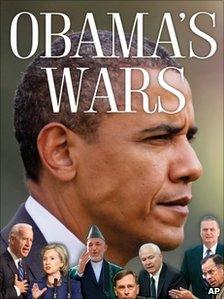New book digs into Obama strategy
- Published

Woodward has chronicled successive US presidencies
When the first excerpts of a gossipy political blockbuster hit the newsstands, there are two standard responses by those who are featured: "It's not true," and "it's not new."
Having invited Bob Woodward, with his unimpeachable journalistic credentials, into the White House, the Obama administration is hardly in a position to deny what he has written.
Instead, it is falling back on the second response - that Mr Woodward's depiction of an Afghanistan policy characterised by personality clashes and policy divisions is old news.
To a point, that is true.
The fierce internal debate which led to the president's announcement of a 30,000-strong troop surge last December is well-documented; while the Rolling Stone profile which cost General Stanley McChrystal his job in June laid bare the colliding egos of senior military and political figures.
However, Mr Woodward's book digs deeper - most obviously, by unearthing new layers of personality dirt.
'No nation building'
If you want to know what Joe Biden thinks about Richard Holbrooke's parentage, or what General Petraeus thinks of David Axelrod's professionalism, it is here - in the form of colourful quotations that will no doubt help sell the book.
But far more significant is the policy picture that emerges, of a president actively seeking an exit strategy from Afghanistan.
"I'm not doing 10 years," President Obama is quoted as saying to Secretary of State Hillary Clinton and Defence Secretary Robert Gates.
"I'm not doing long-term nation building. I am not spending a trillion dollars."
And separately, he is quoted as telling aides: "This needs to be a plan about how we're going to hand it off and get out of Afghanistan."
By Mr Woodward's account the Pentagon and senior civilian officials resisted this line.
Richard Holbrooke, the president's special representative for Afghanistan and Pakistan, reportedly said of the troop strategy: "It can't work."
General David Petraeus, at the time head of US Central Command, is portrayed as favouring a long-term counter-insurgency effort, modelled on previous success in Iraq.
He is quoted as saying: "This is the kind of fight we're in for the rest of our lives and probably our kids' lives."
Mr Woodward implies that Vice-President Joe Biden's much-publicised opposition to counter-insurgency was a tactic, played out at Mr Obama's request, to encourage the Pentagon to compromise.
To resolve the internal differences, President Obama is said to have drawn up a six-page "terms agreement," committing all parties into his chosen path of 30,000 additional troops and the beginnings of a draw-down in July 2011.
Risky tactic
Mr Woodward describes how Mr Obama unveiled the document at a White House meeting in November 2009, asking anyone who had objections to "say so now".
By using Mr Woodward to make this document public (it is expected to be included in the appendix, when the book is officially released next week) the White House is, in effect, copying the rest of us in on a written agreement within the administration, which Mr Obama hopes will avert any further public squabbling with the Pentagon over troop numbers.
It is an intriguing tactic, which will no doubt resonate as the clock ticks towards next July.
But such media management carries huge risks.
The president's opponents will seize upon a quote in which Mr Obama reportedly told Republican Senator Lindsey Graham: "I can't let this be a war without end, and I can't lose the whole Democratic Party."
The implication, that the Afghanistan strategy was dictated by party political criteria, is angrily denied by White House officials.
They argue the book illustrates that Mr Obama took "a broad and clear-eyed view of our national security and his role as president."
Pill popper?
What else has Mr Woodward produced that is new?
First, firm confirmation that the CIA is running a 3,000 strong "covert army" of Afghan paramilitaries, to hunt and kill members of the Taliban.
Obama hopes to start a withdrawal from Afghanistan next year
"This is one of the best Afghan fighting forces and it's made major contributions to stability and security," a US official told the 麻豆官网首页入口.
Mr Woodward claims the Afghan unit has also pursued Taliban and al-Qaeda targets across the border in Pakistan - potentially, a further source of friction between the two neighbours.
According to Woodward, President Obama highlighted the al-Qaeda threat in Pakistan's remote tribal regions, reportedly telling one meeting: "The cancer is Pakistan."
Second, the very personal allegation that Afghan President Hamid Karzai has been diagnosed a manic depressive - a claim attributed to US intelligence reports.
Mr Woodward quotes the US Ambassador to Kabul, Karl Eikenberry, as saying of Mr Karzai: "He's on his meds, he's off his meds".
It is difficult to see how that will help Mr Eikenberry's already strained relationship with the Karzai government, which has angrily denied that its man is a pill-popper.
Finally, President Obama makes a noteworthy remark about terrorism to Woodward, in an hour-long interview for the book.
Seeking to play down the potential effects of a further attack on US soil, he says: "We can absorb a terrorist attack. We'll do everything we can to prevent it, but even a 9/11... We absorbed it and we are stronger."
On the face of it, the tone is optimistic - but implicitly, Mr Obama acknowledges that another devastating attack will be difficult to prevent.